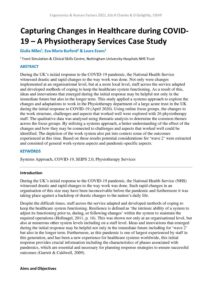| Document | Author Giulia Miles, Eva-Maria Burford & Laura Evans |
| Abstract During the UK’s initial response to the COVID-19 pandemic, the National Health Service witnessed drastic and rapid changes to the way work was done. Not only were changes implemented at an organisational level, but at a more local level, staff across the service adapted and developed methods of coping to keep the healthcare system functioning. As a result of this, ideas and innovations that emerged during the initial response may be helpful not only in the immediate future but also in the longer term. This study applied a systems approach to explore the changes and adaptations to work in the Physiotherapy department of a large acute trust in the UK during the initial response to COVID-19 (April 2020). Using online focus groups, the changes to the work structure, challenges and aspects that worked well were explored with 26 physiotherapy staff. The qualitative data was analysed using thematic analysis to determine the common themes across the focus groups. By utilising a systems approach, a better understanding of the effect of the changes and how they may be connected to challenges and aspects that worked well could be identified. The depiction of the work system also put into context some of the outcomes experienced at this time. Based on these results potential considerations for ‘wave 2’ were extracted and consisted of general work-system aspects and pandemic-specific aspects. |

